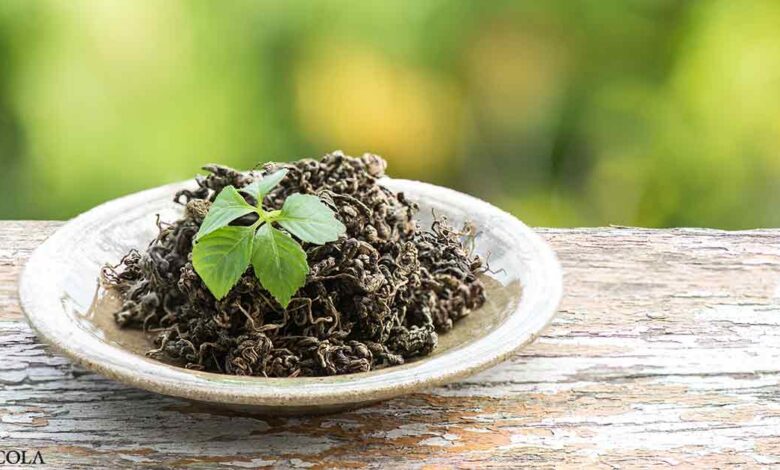
When it comes to popular herbs in traditional Chinese medicine (TCM), you probably think of ginseng, goji berries, and astragalus. But have you heard of jiaogulan? This herb has a long history in TCM and is revered for promoting longevity, stamina, cardiovascular health, and more. Now, modern science is beginning to confirm these ancient claims with hard data.
One of the reasons jiaogulan is becoming widely appreciated is its high antioxidant content. According to studies, this humble plant has eight times the antioxidant power of green tea, earning it the name “the immortality herb.”
The Herb That Promotes Longevity — Basic Facts About Jiaogulan
Jiaogulan (Gynostemma pentaphyllum) is a creeping perennial herb that belongs to the Cucurbitaceae family. It’s also known by other names, such as southern ginseng or fairy herb, and is widely used in Northeast and Southeast Asia.1,2 In a New York Post article, Dr. Michael Aziz, a board-certified internal medicine physician, provides insight as to why jiaogulan is rising in popularity in recent years.3
• Jiaogulan has been used in folk medicine for centuries — One study notes that its use dates back to 1406 CE, when it was identified as a valuable survival food. However, in the U.S., very few people know about it, Aziz said. Some of jiaogulan’s benefits include helping boost metabolism, lower cholesterol, and promote longevity.
• This herb surpasses green tea’s antioxidant levels — Oxygen Radical Absorbance Capacity (ORAC) is a laboratory test that measures how well a food or substance neutralizes harmful free radicals. According to Aziz, jiaogulan’s ORAC value is eight times higher than green tea. To put it simply, the higher the ORAC score, the better the food protects your cells.
• Jiaogulan is available as an herbal tea or a supplement — Aziz says he consumes 900 milligrams of jiaogulan daily, brewing 1 to 2 teaspoons of jiaogulan tea leaves in 250 milliliters of water. He describes its flavor as bitter, earthy, and slightly sweet.
• The herb’s bitterness comes from saponins — In particular, jiaogulan contains gypenosides, a type of saponin that’s similar to the ginsenosides in ginseng. Aziz explains:
“Gypenosides stimulate AMP-activated protein kinase, an enzyme that plays a central role in maintaining cellular energy balance. They have antioxidant effects. They also improve insulin signaling and improve the function of mitochondria, which are the batteries of our cells. Those are some of the hallmarks of aging that affect longevity.”4
How This Ancient Herb Restores Balance and Curbs Inflammation
A recently published study featured in the Journal of Functional Foods offered a fresh look at how jiaogulan offers multiple benefits in body. After conducting an in-depth review of existing pharmacological literature on gypenosides and jiaogulan extracts.5
The study outlines how this herb influences multiple systems, particularly through its detoxifying, anti-inflammatory, and circulation-supporting effects.
• Jiaogulan can be categorized into three flavors — These are sweet, bitter, and slightly bitter. Each flavor exhibits distinct efficacy and effects. For example, in TCM, the bitter gypenosides are believed to clear “heat” and reduce inflammation, toxic buildup, and oxidative stress, while sweet compounds promote healthy organs, blood, and “qi” (your life force or energy). According to the researchers:
“The bitter taste and cold nature of GP [Gynostemma pentaphyllum] are particularly effective in clearing heat and detoxifying the body, making it beneficial for conditions such as viral hepatitis, chronic gastroenteritis, and chronic bronchitis [sic].
In addition, the sweet taste of GP nourishes the heart and protects the liver, benefits the qi and blood better, and is more effective against hyperlipidemia, hypertension, fatty liver, insomnia, and headaches.”
• The study highlights jiaogulan’s antioxidant effects — According to their research, this herb helps scavenge harmful molecules like DPPH and hydroxyl radicals before they inflict long-term damage. An overload of reactive oxygen species (ROS) in the body causes oxidative stress, which leads to numerous chronic diseases, including cancer, hypertension, diabetes, and atherosclerosis.
• Jiaogulan also has beneficial effects for diabetics — This herb is a valuable dietary ally for those managing diabetes, offering metabolic support while reducing reliance on pharmaceutical drugs.
Jiaogulan protects and repairs pancreatic beta cells, which are responsible for producing insulin, and enhances the production of key antioxidant enzymes like superoxide dismutase (SOD) and glutathione peroxidase (GSH-px), activating the Nrf2 signaling pathway to shield these cells from oxidative damage. It also inhibits alpha-glucosidase and alpha-amylase — enzymes that break down carbohydrates into glucose — thereby slowing the rise in blood sugar after meals.
• The herb also supports liver health — Jiaogulan has hepatoprotective effects, meaning it supports liver detoxification, protects against liver injury, and even shows promise in treating nonalcoholic fatty liver disease (NAFLD). According to the researchers:
“Through an experimental liver disease model induced by carbon tetrachloride (CCl4), GP has been shown to significantly alleviate hepatocyte necrosis and liver injury, which involves downregulation of Bax and cleaved PARP expression and upregulation of Bcl-2 expression.
In summary, GP has demonstrated extensive activity and application prospects in liver protection through various mechanisms, providing valuable natural resources for the development of new liver disease treatment drugs.”6
Overall, this research paper shows how jiaogulan works across systems to restore overall balance — something modern approaches often miss. Rather than just being another “anti-inflammatory” herb, it supports deep, systemic regulation that aligns both ancient and modern views of how healing should work.
Jiaogulan Actively Reprograms Fat and Cholesterol Metabolism
Recent research published in The Journal of Ethnopharmacology explored the specific compounds in jiaogulan responsible for its ability to regulate blood fats, including triglycerides and cholesterol. The study aimed to isolate which active substances are doing the work and map out the exact biological processes involved in their lipid-lowering effects.7
• The researchers looked at 101 individual compounds to identify their effect on lipid levels — They found that jiaogulan doesn’t just block fat absorption or reduce calorie intake. Instead, it goes deeper — modifying how fat is created, stored, and burned inside your body. In one major pathway, it suppresses enzymes that are responsible for turning excess calories into triglycerides (stored fat), while boosting those that help the body break down and use existing fat for energy.
By activating this switch, jiaogulan addresses one of the core drivers of weight gain and high triglycerides — excess lipogenesis, or the internal manufacture of fat from sugars and carbs.
• For cholesterol, the herb uses a different set of tools — It regulates genes that control cholesterol synthesis in the liver. At the same time, it improves how the liver clears out excess cholesterol by enhancing LDL receptor activity. These receptors pull LDL (“bad” cholesterol) from the blood and break it down.
• Jiaogulan also encourages bile acid production — Bile acids are made from cholesterol, so when your body makes more bile, it uses up cholesterol in the process.
The study also highlighted 5′ adenosine monophosphate-activated protein kinase (AMPK) activation as a central player in how jiaogulan supports metabolic health. AMPK is like a cellular thermostat for energy. When it senses low energy in the cell, it triggers pathways to increase fuel usage and reduce storage. Jiaogulan’s gypenosides flip that switch, which leads to increased fat burning, improved insulin sensitivity, and better blood sugar control.
For those struggling with stubborn weight, high triglycerides, or borderline cholesterol, this herb offers multiple levers of support. It doesn’t require a complete lifestyle overhaul to begin making a difference — it meets the body where it is and helps it respond more efficiently to the energy it already has.
Earlier Research Points to Jiaogulan’s Anticancer Benefits
Studies have highlighted this herb’s anticancer effects, and a comprehensive review published in the Chinese Medicine journal demonstrates this. After examining 108 peer-reviewed studies, the researchers confirmed that jiaogulan has broad-spectrum anticancer activity across 30 different cancer cell lines, while leaving normal cells largely unharmed.8
• The study included a wide range of tumor types from leukemia to liver, breast, and colon cancers — In one clinical report, patients receiving Gynostemma pentaphyllum (GpM) therapy had far lower relapse and metastasis rates compared to untreated controls (11.9% vs. 72.4% for relapse, and 8.5% vs. 55.2% for metastasis). Patients also showed improved immune responses, a key measure of resilience during cancer treatment.
• In terms of how fast and how powerfully GpM worked, the numbers were impressive — A compound called GP-B1 showed 65.4 µg/mL inhibitory concentration (IC50) against B16 melanoma cells, meaning it effectively blocked tumor cell growth at a relatively low dose.
Another component — a carotenoid fraction — had one of the lowest IC50 values recorded, at just 1.6 µg/mL against Hep3B liver cancer cells. Gypenosides also reduced tumor sizes by up to 75% in live animal models of colorectal cancer over 19 days.
• So what exactly improved? The researchers noted that GpM extracts stopped cancer cells from multiplying, triggered them to self-destruct, and prevented them from spreading. Polysaccharides from GpM also enhanced the body’s immune response, increasing levels of cancer-fighting cells and chemicals like tumor necrosis factor-a (TNF-a), interleukin-10 (IL-10), and interferon-γ.
These compounds didn’t just work in lab dishes — they shrank tumors in mice and boosted survival rates without harming healthy tissues.
Time-wise, the effects of GpM compounds were impressive, appearing just within days in lab tests. In animal models, tumors shrank significantly after just four weeks of treatment. And importantly, the longer the treatment continued, the more pronounced the anticancer effects became. For example, tumor size in SAS oral cancer models dropped by 65.76% after 28 days of daily gypenoside injections.
• Some extracts showed particularly strong benefits in certain types of cancers — For example, the carotenoid and chlorophyll fractions were particularly effective against liver cancer cell lines. Meanwhile, polysaccharides were more potent in melanoma and colorectal models, while gypenosides were broadly effective across leukemia, lung, prostate, and gastrointestinal cancers.
• Saponins (especially gypenosides) and polysaccharides were the most potent cancer-fighting agents — Saponins halted the cancer cell cycle, while polysaccharides acted more like immune boosters, giving the body extra firepower to fight tumors naturally. Other compounds like flavonoids and chlorophyll had moderate effects, with antioxidant benefits that complemented the main therapeutic effects.
Lastly, jiaogulan slowed down energy production in cancer cells by blocking glycolysis — a trick cancer cells use to fuel their aggressive growth — while enhancing immune response markers.
“In summary, GpM has been investigated extensively as a potent anti-cancer agent against many types of cancers both in vitro and in vivo. The general consensus from the literature is that GpM exerts its anti-cancer activities through multiple mechanisms, including cell cycle arrest, the induction of apoptosis, inhibition of invasion and metastasis, glycolysis inhibition and immunomodulation,” the researchers concluded.9
How to Safely Use Jiaogulan
Jiaogulan is popularly taken as an herbal tea and dietary supplement, but in China, it is also used in meals, like a vegetable. The immature stems are commonly eaten as a cold dish, similar to a salad, while the leaves are added to congee for flavor.10
• What’s the ideal dose? In studies, daily doses of up to 450 ml for 16 weeks (divided into two doses, one in the morning and another at night) have been found to be safe. However, it’s best to consult with your doctor to confirm the appropriate dosage for your needs.11
• Possible side effects — While jiaogulan has been found to be generally safe, there are instances when it causes minor side effects, like nausea and diarrhea. In rare cases, vomiting, dizziness, tinnitus, constipation, and blurred vision may occur.12
• Always consult with your healthcare provider before using jiaogulan — Jiaogulan’s safety in pregnant women and breastfeeding mothers has not been studied, so if you fall under these groups, it may be better to avoid using this herb.
According to VeryWell Health, the gypenosides in jiaogulan inhibit a liver enzyme called cytochrome P450 2D6 (CYP2D6), which is responsible for breaking down certain medications. Insufficient amounts of this enzyme may cause the drugs to build up in your body, leading to toxicity.13 Hence, if you’re taking any medications, check with your physician if jiaogulan is safe for you to take.
“Diabetics should be careful and adjust their medications down with the help of their doctors if they drink massive amounts,” Aziz said. This is due to jiaogulan’s ability to lower blood sugar.
Frequently Asked Questions (FAQs) About Jiaogulan
Q: What is jiaogulan and why is it called the “immortality herb”?
A: Jiaogulan (Gynostemma pentaphyllum) is a climbing herb used for centuries in Traditional Chinese Medicine. It’s called the “immortality herb” due to its reputation for promoting longevity, vitality, and disease resistance — now supported by research showing its potent antioxidant and metabolic effects.
Q: How does jiaogulan compare to green tea in antioxidant strength?
A: Jiaogulan has an ORAC (Oxygen Radical Absorbance Capacity) score eight times higher than green tea. This makes it extremely effective at neutralizing harmful free radicals, reducing oxidative stress, and supporting healthy aging and disease prevention.
Q: What are the metabolic and cardiovascular benefits of jiaogulan?
A: Jiaogulan activates AMPK, a key enzyme that regulates energy use and fat metabolism. It improves insulin sensitivity, lowers blood sugar, reduces triglycerides and LDL cholesterol, and boosts fat burning — making it beneficial for managing weight, diabetes, and heart health.
Q: Can jiaogulan help protect against cancer and support the immune system?
A: Yes. Research shows that jiaogulan extracts inhibit cancer cell growth, induce apoptosis (cell death), and prevent metastasis across various cancers, including liver, colon, and breast. Its polysaccharides and gypenosides also enhance immune responses without damaging healthy cells.
Q: Is jiaogulan safe to use, and how should it be taken?
A: Jiaogulan is generally safe when consumed as tea or supplements (up to 450 ml daily in studies), but may cause mild side effects like nausea or dizziness in some people. It may interact with medications, especially those processed by liver enzymes or used for diabetes. Always consult a healthcare provider before starting.
Source link




